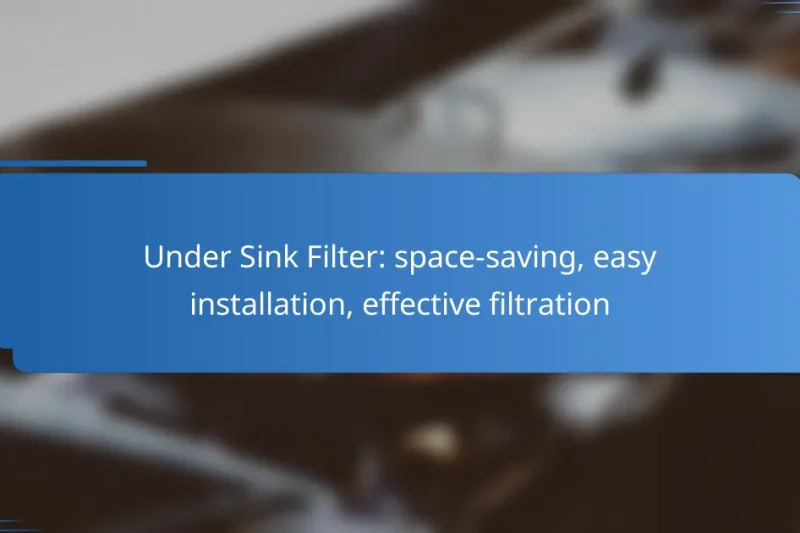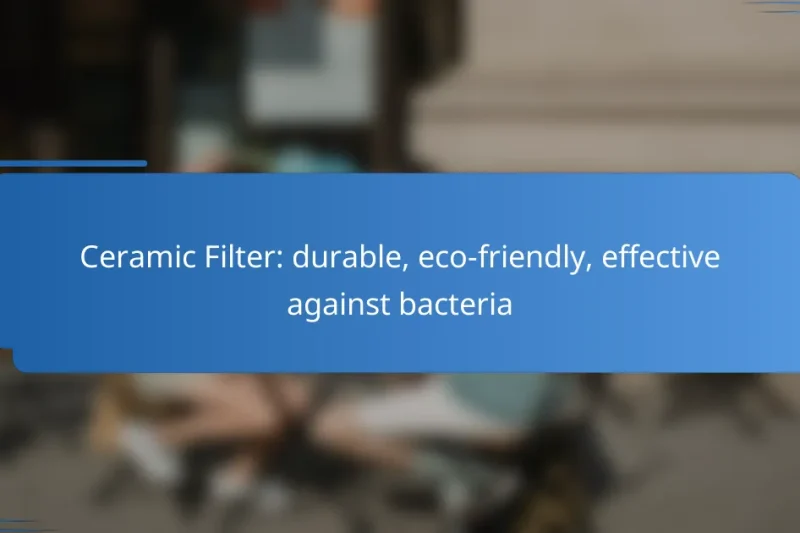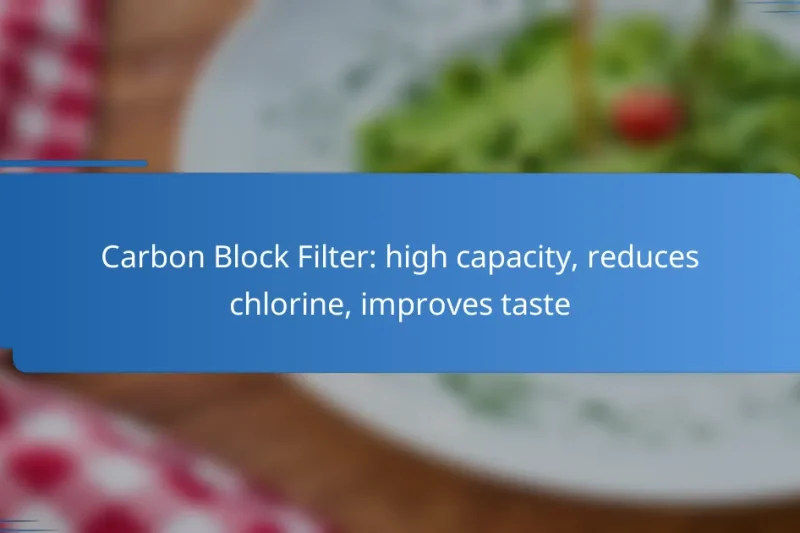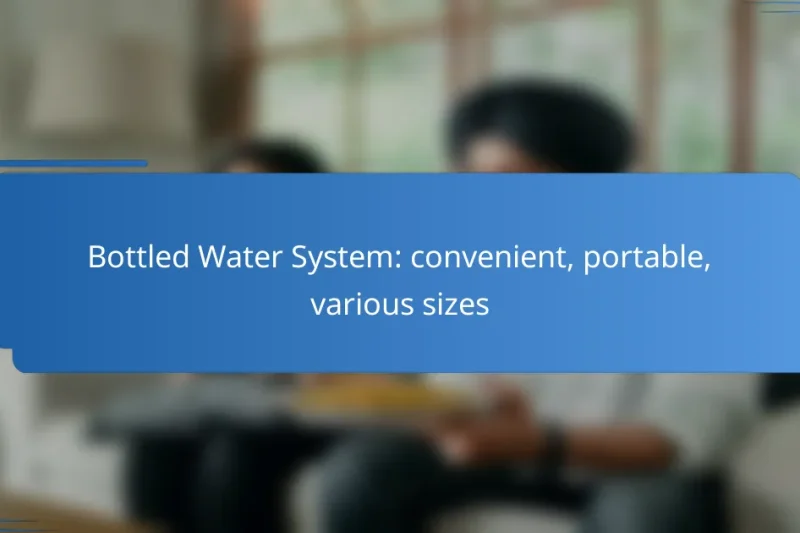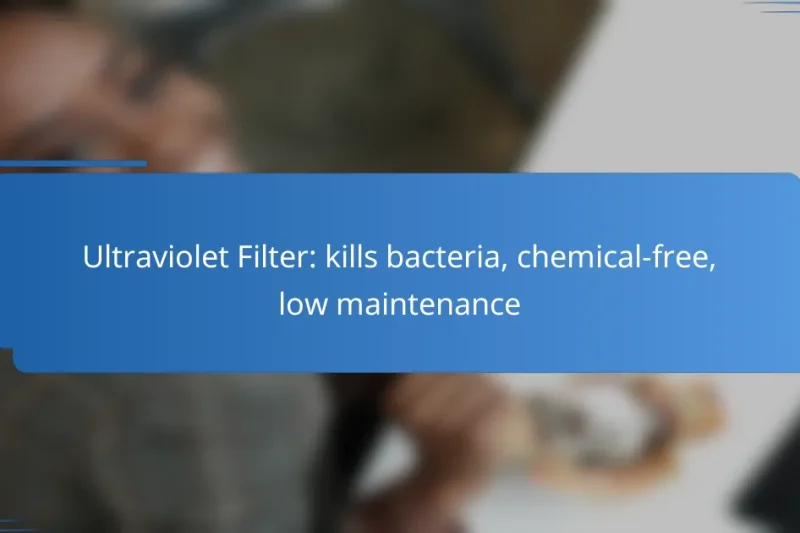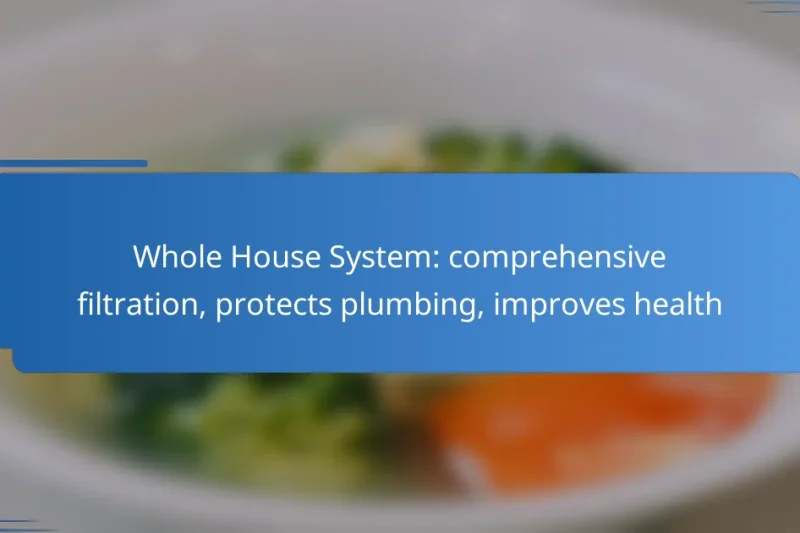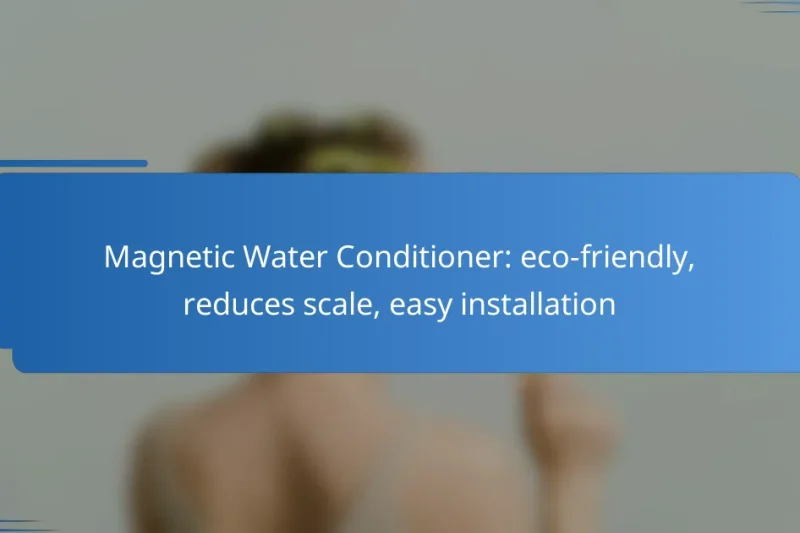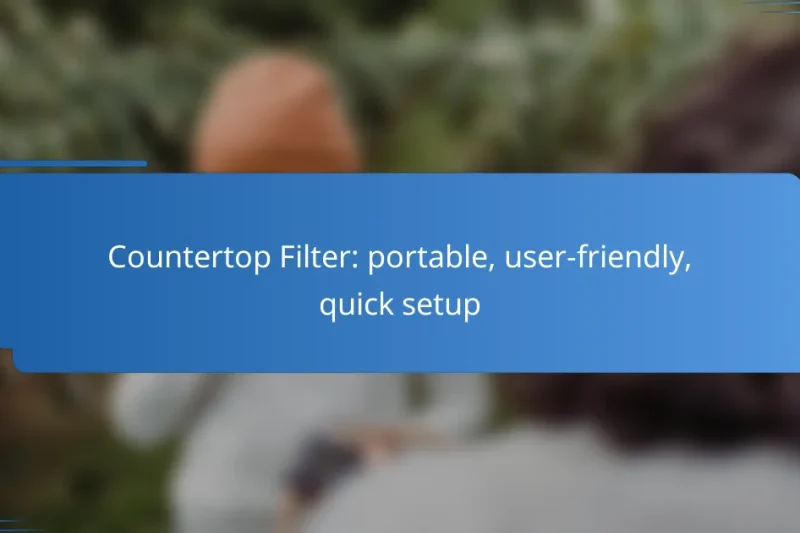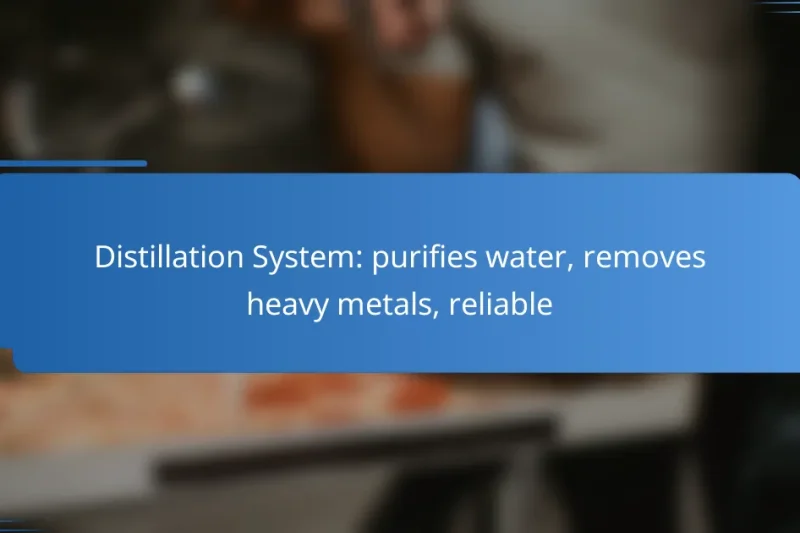Under sink filters are an excellent solution for those seeking effective water purification without sacrificing valuable … Under Sink Filter: space-saving, easy installation, effective filtrationRead more
Benefits of Different Water Filtration Systems
Water filtration systems play a crucial role in ensuring access to clean and safe drinking water. Different types of filtration methods, such as reverse osmosis, activated carbon, and UV purification, each offer unique benefits in removing impurities and enhancing water quality. Understanding these systems can help consumers make informed choices for their water treatment needs.
Ceramic Filter: durable, eco-friendly, effective against bacteria
Ceramic filters are an excellent choice for water purification, combining durability and eco-friendliness with effective bacteria … Ceramic Filter: durable, eco-friendly, effective against bacteriaRead more
Carbon Block Filter: high capacity, reduces chlorine, improves taste
A carbon block filter is designed to enhance water quality by significantly reducing chlorine levels and … Carbon Block Filter: high capacity, reduces chlorine, improves tasteRead more
Bottled Water System: convenient, portable, various sizes
Bottled water systems offer a convenient solution for accessing clean drinking water, available in various sizes … Bottled Water System: convenient, portable, various sizesRead more
Ultraviolet Filter: kills bacteria, chemical-free, low maintenance
Ultraviolet (UV) filters provide a chemical-free solution for killing bacteria by using UV light to disrupt … Ultraviolet Filter: kills bacteria, chemical-free, low maintenanceRead more
Whole House System: comprehensive filtration, protects plumbing, improves health
A whole house filtration system provides a comprehensive solution for ensuring clean and safe water throughout … Whole House System: comprehensive filtration, protects plumbing, improves healthRead more
Magnetic Water Conditioner: eco-friendly, reduces scale, easy installation
A magnetic water conditioner is an eco-friendly solution that utilizes magnetic fields to alter the physical … Magnetic Water Conditioner: eco-friendly, reduces scale, easy installationRead more
Pitcher Filter: convenient, affordable, easy to use
Pitcher filters are an affordable and convenient solution for enhancing the quality of tap water at … Pitcher Filter: convenient, affordable, easy to useRead more
Countertop Filter: portable, user-friendly, quick setup
Portable countertop filters are an excellent solution for those seeking clean drinking water with minimal hassle. … Countertop Filter: portable, user-friendly, quick setupRead more
Distillation System: purifies water, removes heavy metals, reliable
A distillation system is an effective method for purifying water by heating it to create steam … Distillation System: purifies water, removes heavy metals, reliableRead more
What are the benefits of reverse osmosis water filtration systems?
Reverse osmosis water filtration systems offer numerous advantages, primarily in their ability to remove impurities and provide cleaner drinking water. These systems are designed to filter out contaminants, improving both the safety and quality of water for everyday use.
Removes contaminants effectively
Reverse osmosis systems excel at eliminating a wide range of contaminants, including heavy metals, chlorine, fluoride, and other harmful substances. By forcing water through a semipermeable membrane, these systems can achieve a reduction rate of up to 95% for many pollutants.
It’s essential to consider the specific contaminants present in your water supply when choosing a system. Testing your water can help identify which impurities need to be addressed, ensuring you select a reverse osmosis system that meets your needs.
Improves taste and odor
One significant benefit of reverse osmosis filtration is the enhancement of water’s taste and odor. By removing chlorine and other chemicals, the water becomes fresher and more palatable, making it more enjoyable to drink and use in cooking.
Many users notice a marked improvement in the flavor of beverages, such as tea and coffee, when made with reverse osmosis water. This enhancement can be particularly beneficial in areas where tap water has a strong chemical taste or unpleasant smell.
Provides safe drinking water
Safety is a primary concern when it comes to drinking water, and reverse osmosis systems provide a reliable solution. By effectively removing harmful contaminants, these systems help ensure that the water you consume is safe and healthy.
In regions where water quality is questionable or where there are frequent reports of contamination, investing in a reverse osmosis system can provide peace of mind. Regular maintenance and filter replacement are crucial to maintaining the system’s effectiveness and ensuring ongoing safety.
How do activated carbon filters enhance water quality?
Activated carbon filters enhance water quality by effectively removing impurities, such as chlorine, volatile organic compounds, and other contaminants. They work through adsorption, where pollutants adhere to the surface of the carbon, resulting in cleaner, safer drinking water.
Reduces chlorine and chemicals
Activated carbon filters significantly reduce chlorine and various chemicals commonly found in municipal water supplies. By adsorbing these substances, they help eliminate the unpleasant taste and odor associated with chlorine treatment.
These filters can also remove harmful chemicals like pesticides and industrial solvents, contributing to overall water safety. Regular maintenance and timely replacement of the filter are essential to maintain its effectiveness.
Improves taste and clarity
One of the most noticeable benefits of activated carbon filters is the improvement in taste and clarity of water. By removing impurities, the water becomes more palatable and visually appealing.
This enhancement is particularly beneficial for households that rely on tap water for drinking and cooking. Users often report a fresher taste, making it easier to stay hydrated and enjoy beverages.
Cost-effective and easy to install
Activated carbon filters are generally cost-effective compared to other filtration systems, with prices often ranging from $20 to $100, depending on the type and capacity. They are available in various forms, including pitcher filters, faucet-mounted units, and under-sink systems.
Installation is typically straightforward, requiring minimal tools and time. Most users can set up a carbon filter in less than an hour, making it an accessible option for improving water quality without significant investment.
What advantages do UV water purification systems offer?
UV water purification systems provide effective disinfection by using ultraviolet light to eliminate harmful microorganisms. These systems are particularly valued for their ability to purify water without introducing chemicals, making them a safe choice for drinking water treatment.
Kills bacteria and viruses
UV water purification systems are highly effective at killing bacteria and viruses present in water. The UV light disrupts the DNA of these pathogens, rendering them unable to reproduce and cause illness. This method can eliminate common contaminants such as E. coli and Giardia, ensuring safer drinking water.
In many cases, UV systems can achieve a disinfection rate of over 99.9%, making them a reliable option for households and businesses alike. Regular testing of water quality can help confirm the effectiveness of the system.
Chemical-free disinfection
One of the main benefits of UV water purification is that it does not rely on chemicals for disinfection. This means there are no harmful byproducts, such as chlorine or chloramine, which can alter the taste and odor of water. As a result, users can enjoy clean, fresh-tasting water without the concerns associated with chemical treatments.
Moreover, chemical-free disinfection is particularly beneficial for sensitive populations, such as children and individuals with compromised immune systems, as it minimizes exposure to potentially harmful substances.
Low maintenance requirements
UV water purification systems typically require minimal maintenance, making them convenient for users. Regular maintenance usually involves changing the UV lamp annually and cleaning the quartz sleeve to ensure optimal performance. This straightforward upkeep allows users to focus on enjoying clean water rather than extensive maintenance tasks.
Additionally, many UV systems come with monitoring features that alert users when maintenance is needed. This proactive approach helps maintain system efficiency and ensures continuous protection against contaminants.
How to choose the right water filtration system for your home?
Selecting the right water filtration system involves understanding your water quality, installation requirements, and budget. Assessing these factors will help you find a system that meets your needs effectively.
Assess water quality and contaminants
<p Begin by testing your water to identify specific contaminants, such as chlorine, lead, or bacteria. Home testing kits are widely available and can provide insights into your water's quality.
<p Consider local water quality reports, which often detail common contaminants in your area. This information can guide you in selecting a filtration system that targets those specific issues.
Consider installation and maintenance
<p Evaluate how easy the filtration system is to install and maintain. Some systems, like faucet-mounted filters, require minimal setup, while others, such as whole-house systems, may need professional installation.
<p Regular maintenance is crucial for optimal performance. Check if the system requires frequent filter changes and whether replacement filters are readily available and affordable.
Evaluate budget and long-term costs
<p Determine your initial budget for purchasing a filtration system, but also consider long-term costs, including maintenance and replacement filters. Some systems may have a lower upfront cost but higher ongoing expenses.
<p Compare the total cost of ownership over several years to understand the true financial impact. Look for systems that offer a good balance between initial investment and long-term savings.
What are the environmental impacts of water filtration systems?
Water filtration systems can significantly reduce environmental harm by minimizing waste and conserving natural resources. They help decrease reliance on bottled water, which contributes to plastic pollution and resource depletion.
Reduces plastic waste from bottled water
Using water filtration systems reduces the need for bottled water, which is a major source of plastic waste. By filtering tap water, households can avoid purchasing single-use plastic bottles, thereby decreasing the overall plastic footprint.
For instance, a family that switches to a filtration system may eliminate hundreds of plastic bottles from their consumption each year. This shift not only helps reduce landfill waste but also lowers the carbon emissions associated with producing and transporting bottled water.
Conserves water resources
Water filtration systems can contribute to the conservation of water resources by promoting the use of tap water over bottled alternatives. This practice helps preserve groundwater and reduces the energy required for water extraction and distribution.
Moreover, many filtration systems are designed to minimize water waste during the filtration process. For example, reverse osmosis systems often waste some water, but newer models are engineered to be more efficient, using less than 3 gallons of water for every gallon filtered.
